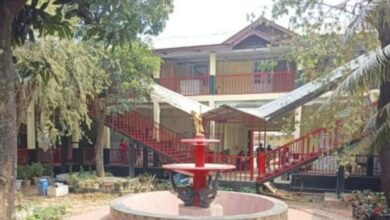An important announcement
PAS is the preferred medium of public communication in times of crises even in the age of social media

This is an important announcement,” the loudspeaker blared, this time in English. It has already shared the information in Khasi. The buzz outside the locality’s grocery shop stops and buyers, who missed the earlier announcement, prick up their ears. Among them is a young man who stops fidgeting with a sleek smartphone and pays attention to the voice. Their day’s plans depend on the announcement. Times are uncertain and one has to be attentive to every word that blares through the PA system.
It was the dwindling law and order three years back; it is the pandemic now. The problems may have changed with time but the good old public announcement system has remained the most trusted medium to dissipate information at the locality level.
“When it comes to inform the residents of a locality, the PA system is always a better option than social media,” says W Chyne, the assistant headman of Lower Lachaumiere.
As the city grapples with the second wave of Covid-19, every locality is setting the rules in tandem with the government’s guidelines to keep the infection at bay. The rules are then announced through loudspeakers to make residents aware of the dos and don’ts. The same is repeated at frequent intervals to ensure that none misses the instructions.
Chyne says the information is recorded and played at least twice a day. The announcements are made in multiple languages, including Khasi and English, depending on the composition of the population in a particular locality.
“Our locality does not have too many Hindi-speaking residents and so the announcements are made in Khasi and English. We record the information and play it whenever it is necessary,” informs Chyne.
As the announcement stops, the buzz outside the shop resumes. “Need to DM my friends on Instagram about the restrictions on movement,” the young man’s monologue has a hint of annoyance. A middle-aged man looks at his watch and asks the shopkeeper to hurry up, “I need to get vegetables too and there’s only an hour left for the vendors to pack up for the day. Can you please make it fast?” Others start talking about the lockdown pangs and argue about the necessity of such a “harsh measure”. The announcement has changed the public mood and their bantering has drifted towards serious conversations about the current state of affairs. One can fathom the power of a PA system.
Evolution of the machine
The public announcement system has three components — a microphone, an amplifier and a loudspeaker. The rudimentary carbon microphone was invented in the later part of the 19th century by David Edward Hughes. In fact, the term ‘microphone’ was coined by him. It was a simple device that had carbon granules packed between two metal plates. Today, the device — which transfers the energy of sound waves into an electrical signal that can be recorded, edited and broadcast — has become sophisticated with added functions.
The basic loudspeaker was invented by British physicist Oliver Joseph Lodge in the last part of the 19th century, much after telephone and phonograph came into being. The structure used a diaphragm that vibrated with a moving coil. Lodge’s design is the basis of all loudspeakers. The first conical moving-coil loudspeaker was used in 1925, and over the decades, it has transformed into the modern avatar. By that time, the amplifier was already in use. Audion, invented by Lee DeForest, is the mother of the present-day vacuum tube amplifier. An electric PA system was first used in San Francisco on Christmas in the early part of the 20th century. It was the beginning of a new era of convenient public communication.
Drums to diaphragm
While the public communication system worldwide changed fast in the early 1900s, the evolution came decades later in Meghalaya. Senti Ao, a 73-year-old resident of Shillong, recollects how drummers would move around localities during his childhood to deliver an important message.
“One person would come with the Khasi drum and beat it several times before taking a break to make the announcement. That was the norm in the city too. Residents would often gather around the messenger. PA system came much later,” he says.
Henry Wahlang, the headman of Lower Lumparing, remembers how groups of people went around respective localities, shouting messages. The ‘hoi kiw’ cry in unison reverberated intermittently. “The Dorbar members also used hand-made posters. Door-to-door messaging was also common,” he adds.
“When I was growing up, I remember one person would come out at night with the handle-held loudspeaker and make announcements,” says 50-year-old Chyne.
Today, every locality has multiple loudspeakers and modern amplifiers for better clarity. Some Dorbar, like in Lower Lachaumiere, are also planning to upgrade to better devices.
As the lockdown keeps extending, many localities are using the PA system to keep residents entertained. Dorbar Shnong in areas like Laban and Lachaumiere play music — popular English music and modern Khasi songs — before and after an announcement to enliven the residents’ spirit.
Social media vs PAS
When it comes to dissipating information at the micro level, the PA system is always the preferred option. “I would always choose PAS over any social media platform to give out crucial information. Announcements can be made immediately and can be repeated too. It is authentic and gives people a sense of urgency and priority. Sometimes information on social media is not reliable,” says Hamsya Chen, the assistant headman of Kench’s Trace-Oxford-Rilbong area.
Chen informs that the dorbar has an internal WhatsApp group where administrative matters are discussed. But for residents’ awareness, loudspeakers shout out messages.
“Also, not everyone has a smartphone or is conversant with social media,” said Chyne.
In rural areas where mobile internet connectivity is poor, the PAS is the only option for information. In 2018, when the city witnessed a communal flare-up, the government was forced to shut down mobile internet. That time too, PAS proved to be the medium for both Dorbar Shnong ad government authorities. “I do not know why but I always associate PAS with an emergency situation. But, of course, loudspeakers are an intrinsic part of festivals and celebrations too,” says a young citizen.
“Do not come out of your house without mask, do not crowd near shops, do not come out if not necessary,” a female voice announces on the loudspeaker and repeated the message in three more languages. The shopkeeper is alarmed. She hurriedly comes to the counter and instructs a few careless buyers. “Did you hear what the machine said? Wear your masks properly and maintain physical distance.”
The PA system has done its job.
~ Team Sunday Monitor
(Photo by MM)





